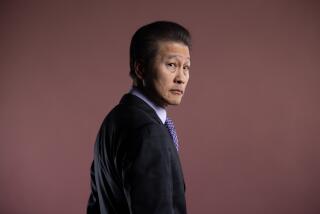Two Banks Vie Online for Black Customers
- Share via
Kevin Cohee and James Mundy used to be colleagues at OneUnited Bank, the nation’s second-largest bank for African Americans. Today, they’re in a rivalry to bring online banking to black customers.
Mundy quit his job as chief operating officer at OneUnited in 2003, hoping to start a “pure” Internet bank with no costly branches. But among the obstacles he faces is fresh competition from Boston-based OneUnited, which began offering online banking last month.
Cohee, OneUnited’s chairman and chief executive, sees Internet banking as a supplemental service, saying customers need “the comfort and security of seeing a branch” before they will do their banking in cyberspace.
Beneath the two approaches lies the same idea, though: to lure African Americans by offering high-interest savings accounts and the promise that their deposits will be recycled to black borrowers in the form of well-priced mortgages, community development loans and church financing.
“This dream is more than 100 years old,” Cohee said. “Black leaders back to W.E.B. DuBois have always communicated the need to utilize the spending power of black people to benefit the community.”
Arguing that the time is right to realize that dream, Mundy tells prospective investors of the growing financial clout of African Americans.
The U.S. Census Bureau counted more than 3.9 million African American households with more than $50,000 in income in 2004 (up from about 2 million in 1994), and that’s Mundy’s target customer base.
Keenly aware of their ethnic identity even as they disperse from traditional urban neighborhoods, these middle-class blacks are “arguably more inclined than their white counterparts to make purchasing decisions based on community or race,” his formal proposal to investors says.
But the products being purchased must be attractive, Mundy added.
Most of the country’s four dozen black banks started years ago in inner cities. Now struggling to compete with larger banks on price and convenience, they “lack the resources necessary for new-product development, targeted marketing initiatives and suburban branch expansion,” he said.
Mundy said he tried without success for several years to persuade Cohee to fill that gap by providing service over the Internet. At that time, he said, Cohee believed that blacks weren’t interested in doing their banking online.
“He must have seen the light,” Mundy said, referring to OneUnited’s recent Internet initiative.
Cohee has a different recollection, saying Mundy led “a group of our staff who were working on a project and decided to take it outside.” Even so, Cohee acknowledged having changed his views about his customers’ use of the Internet, describing blacks as “late adopters.”
“But there’s now a sea change as more and more of our population starts to utilize the technology,” Cohee said.
Mundy, who is based in Boston, launched his effort to start an Internet bank for African Americans in 2003, and received approvals from the Office of Thrift Supervision and the Federal Deposit Insurance Corp. last year.
The name BankBlackwell is a word play on “black wealth.” But before Mundy can tap into that wealth, he must raise the $16.5 million called for in his proposal to investors. So far, he said, he has raised about $4 million. Talks continue with pension fund managers, black church leaders and prominent African Americans, but Mundy acknowledges, “We have a way to go.”
OneUnited is considerably further along. Cohee announced last month that his bank had become the first black-operated bank in America to open “full service” Internet banking, allowing customers to open accounts online as well as pay bills, transfer funds and make automatic savings deposits over the Internet.
The largest African American bank, New York’s Carver Federal Savings, lets customers check accounts and pay bills online, but they can’t open accounts through that channel.
While OneUnited will open accounts for customers anywhere in the country, its Internet banking is part of a growth strategy centered on Southern California. The bank has made $500 million in loans during the last three years, nearly all of them in the Los Angeles area, and well over half of them in low- and moderate-income areas, Cohee said.
OneUnited currently operates five branches in Southern California, along with two in Florida and two in Massachusetts.
Cohee said he planned to add five to 10 branches in 12 to 18 months to serve Southern California’s large but dispersed black population.
Many banking experts say a dual Internet and bricks-and-mortar strategy plays better with both customers and investors.
“It’s very difficult to be primarily on the Internet,” said Joseph Gladue, an analyst for Philadelphia investment firm Cohen Bros. who follows minority-owned banks.
“Investors are aware of what happened in the days of the tech boom, when a number of banks started up to be online only and then most of them had to change their model,” Gladue said.
Most banks now use the Internet “as an add-on channel, a convenience for customers,” he added. “Most people want the ability to walk in and talk to someone in person if they have a problem, even if it’s not often.”
Mundy intends to become an exception to that rule by targeting black households that are either affluent or solidly in the middle class, along with black churches. BankBlackwell will aim to provide supplemental services, at least at first, he said, attracting business with online ads for high-interest savings accounts and certificates of deposit.
Customers would keep their checking accounts at traditional banks but would be encouraged to create automatic deductions from those accounts for savings and mortgage payments at Mundy’s bank.
The limited-menu strategy of savings accounts and home lending has worked for Internet banks such as ING Direct, part of the Dutch conglomerate ING Group, Mundy notes.
At OneUnited, Cohee says his goal is to become the country’s largest African American bank. OneUnited has $560 million in assets, up from $540 million at the end of 2005. Carver Federal reported $646 million in assets at year-end.
OneUnited is still officially headquartered in Boston, but Cohee now runs it from L.A.’s Crenshaw district, with a staff of 130 working in offices at Crenshaw Boulevard and Rodeo Road.
“We think Los Angeles is the No. 1 banking market in the country, and this is where we have to be,” he said.
He plans to add branches in Inglewood, Long Beach and possibly the Inland Empire to his existing locations in Los Angeles, Compton and Pasadena. Meantime, OneUnited is advertising on urban-music and smooth-jazz radio stations to reach potential customers throughout Southern California.
Cohee assembled OneUnited by acquiring small banks and thrifts, including two in Los Angeles: Founders National Bank of Commerce and Family Savings Bank. The latter owned the building that now houses what Cohee calls OneUnited’s operational headquarters.
Mundy questioned how it’s possible to afford a branch expansion and at the same time pay the high deposit rates that have attracted customers to Internet banks. In addition, he said, Cohee could lose his bricks-and-mortar customers to his own Internet operations.
Cohee sounds unfazed by such concerns. “Sure,” he said, “there will be some migration out of our existing products. But we’re confident our new growth will outweigh any losses.”
*
(BEGIN TEXT OF INFOBOX)
Chief bankers
James R. Mundy
* Age: 42
* Title: Proposed president and chief executive, BankBlackwell, Boston
* Education: B.A., M.B.A., University of Rochester
*
Kevin Cohee
* Age: 48
* Title: Chairman and chief executive, OneUnited Bank, Boston and Los Angeles
* Education: B.A., M.B.A., University of Wisconsin; J.D., Harvard Law School
Source: Times research
Los Angeles Times
More to Read
Inside the business of entertainment
The Wide Shot brings you news, analysis and insights on everything from streaming wars to production — and what it all means for the future.
You may occasionally receive promotional content from the Los Angeles Times.











